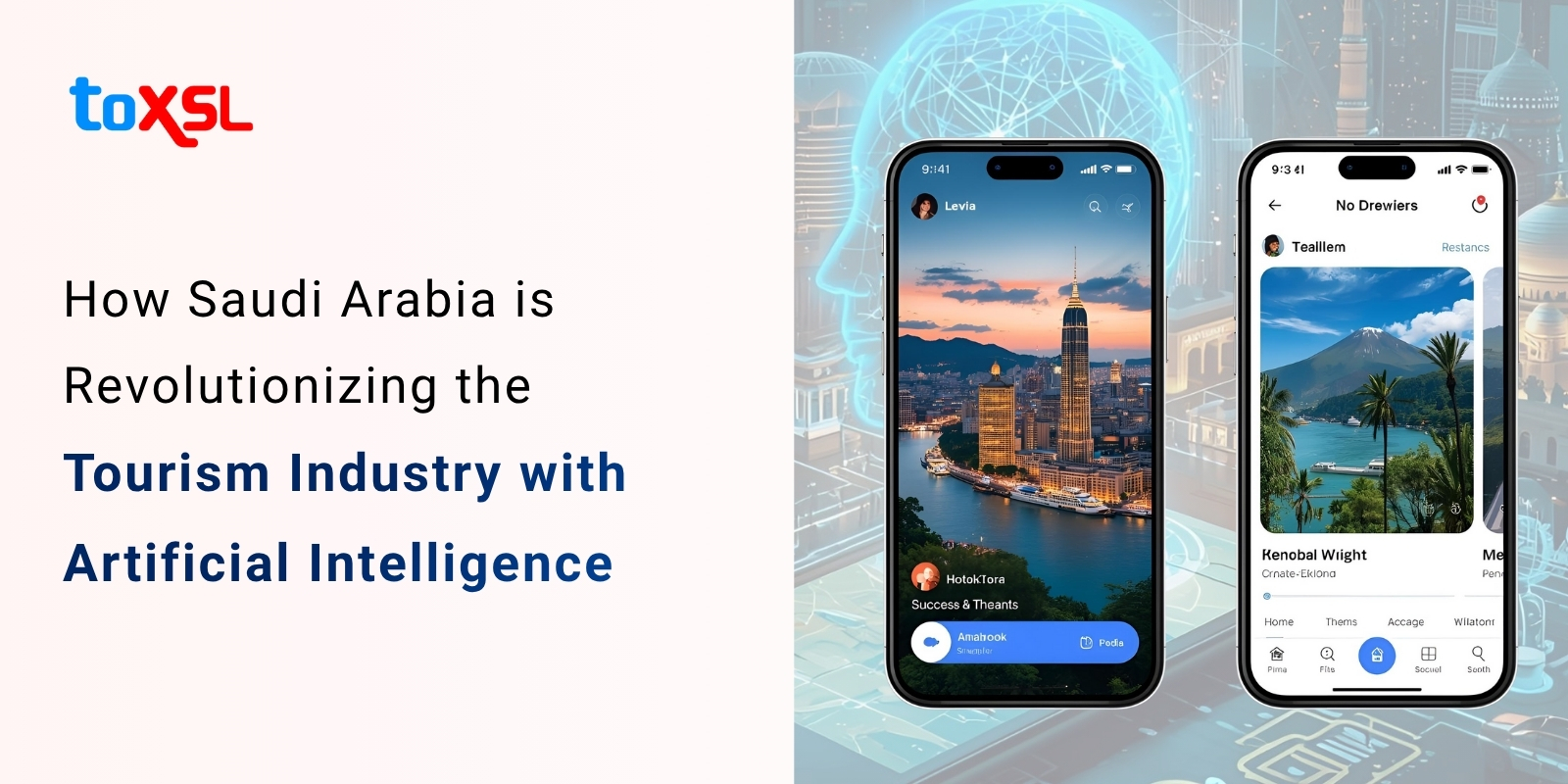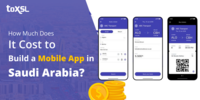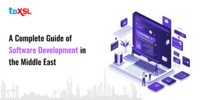- Nov 11, 2025
- Software Development
- 1405
Share this post on:

Tourism in Saudi Arabia is no longer about issuing visas and building hotels. With the goals of the Vision 2030 agenda, the Kingdom is using artificial intelligence not merely as a supporting technology but as a strategic enabler for its tourism ecosystem. From guest-experience personalization to predictive analytics, crowd-management, and immersive heritage technologies, AI is beginning to underpin not how tourists travel in Saudi Arabia but how the destination presents itself to the world.
Key Takeaways
Over 60 million tourists visited Saudi Arabia in the first half of 2025, contributing $43 billion in spending.
AI technologies like digital assistants, AR tours, and biometric systems are transforming visitor experiences.
AI-driven tourism services improve operational efficiency and guest personalization across the travel ecosystem.
The AI tourism market is projected to grow over threefold by 2030, reflecting rapid sector adoption.
Mega projects like NEOM embed AI to create futuristic and sustainable tourism environments.
Strong government-private sector collaboration underpins AI innovation and ethical deployment.
AI also plays a crucial role in sustainable tourism, optimizing resource use and protecting heritage sites.
Why Saudi Arabia’s Tourism Reinvention Needs AI
Saudi Arabia’s tourism reinvention critically depends on artificial intelligence (AI) to achieve its ambitious Vision 2030 goals of economic diversification, sustainable tourism growth, and enhanced global competitiveness. AI is essential not only for delivering personalized and seamless visitor experiences but also for addressing core challenges such as managing high tourist volumes, optimizing resource use, and preserving cultural and natural heritage sites.
Driving Economic Diversification
Saudi Arabia aims to reduce its dependence on oil revenues by making tourism a pillar of its economy, targeting 150 million tourists annually by 2030. AI enables this transformation by powering smarter, more efficient tourism ecosystems. For example, AI algorithms analyze vast data from hyperscale data centers to optimize travel itineraries, forecast demand, and enhance operational efficiency across airports, hotels, and tourist sites. This supports large-scale tourism growth while maintaining high service quality to attract and retain visitors.
Creating Personalized Experiences
AI allows the Kingdom to offer highly personalized experiences tailored to individual preferences and behaviors. Technologies like AI-driven digital assistants (e.g., Sara), augmented reality tours at heritage sites like AlUla and Diriyah, and AI-based recommendation systems transform how tourists explore Saudi Arabia, creating engaging and memorable journeys that improve satisfaction and loyalty. This cognitive tourism approach goes beyond simple digital tools by anticipating and adapting to guests needs in real-time.
Managing Visitor Flows
Saudi Arabia’s natural and cultural heritage sites, such as AlUla, face risks from overcrowding and environmental degradation. AI-powered predictive modeling and real-time data analytics help optimize visitor flows, reduce congestion during peak periods, and promote eco-friendly routes. This approach supports Saudi Arabia’s commitment to sustainable tourism and its net-zero emissions goals by balancing tourism growth with preservation efforts.
Enhancing Operational Efficiency
Infrastructural AI applications improve efficiency in key areas like airport security, immigration, and crowd management, reducing wait times and enhancing visitor convenience. AI-driven demand forecasting helps hotels and transportation providers align capacity with tourist patterns, lowering costs and increasing profitability. Event and crowd management technologies also improve safety at large-scale tourism and entertainment venues.
Building AI Talent Ecosystem
Saudi Arabia recognizes that sustainable AI adoption requires homegrown expertise and strong public-private collaboration. Initiatives by the Saudi Data and AI Authority, partnerships with global AI companies, and programs to upskill local talent ensure continuous innovation and leadership in smart tourism. This ecosystem creates a virtuous cycle of AI-driven growth and economic resilience.
Growing Traveler Expectations
Modern travelers increasingly rely on AI tools such as generative AI and virtual assistants to plan and manage their trips. Reports show over 80% of Saudi tourists use AI-driven technologies for discovering activities and optimizing itineraries. Meeting these expectations is vital for Saudi Arabia to become a competitive and preferred global destination.
Supporting Mega Projects
Mega developments like NEOM embed AI at their core to deliver futuristic, seamless tourism experiences. AI helps integrate personalized services, smart transportation, and sustainable hospitality, reinforcing Saudi Arabia’s strategy to reshape tourism with innovation and visionary urban design.
Strategic Implications: What This Means for Saudi Arabia
Enhancing Competitiveness
By integrating AI deeply into its tourism ecosystem, Saudi Arabia is elevating itself from a region best known for religious pilgrimage to a year-round global destination with modern infrastructure, personalised services, and immersive experiences. This shift strengthens the Kingdom’s brand and competitiveness in the global tourism market.
Economic Diversification
Tourism and tech-enabled tourism specifically promise job creation, investment attraction, and exportable services (e.g., travel-tech platforms, AI-enabled solution providers). The AI job-market spillover from tourism into technology, data science, and smart infrastructure further contributes to economic diversification.
Sustainability & Smart-Destination Management
Tourism growth brings challenges: higher resource consumption, waste, traffic, environmental impact, and threats to cultural sites. AI and smart infrastructure enable Saudi Arabia to manage these pressures proactively, optimising energy use, monitoring visitor flows, predicting maintenance, and regulating waste, thus aligning tourism growth with sustainable development.
Attracting Global Investment & Partnerships
Given the ambitious targets and the heavy involvement of AI and smart infrastructure, Saudi Arabia is positioning itself as a hub for international technology companies, startups, and investors in the tourism-tech space. The growth projections for AI in tourism show there is an emerging market for partnerships, joint ventures, and innovation.
How to Develop a Tourism App in Saudi Arabia
Developing a tourism app in Saudi Arabia requires a strategic approach that aligns with the country's evolving digital landscape, cultural nuances, and regulatory environment. Based on recent insights and best practices, here is a comprehensive guide on how to develop a successful tourism app in Saudi Arabia in 2025.
1. Conduct In-Depth Market Research
Start by understanding traveler preferences, key attractions, and the competitive landscape within Saudi Arabia. Recognize the demand for features like local experiences, multilingual support, and seamless booking systems. With over 97% smartphone penetration and a rapidly growing tourism sector, tailoring your app to local and international tourists is essential.
2. Define Clear Business Objectives
Establish what your app aims to achieve—be it simplifying bookings, offering personalized travel guides, or showcasing cultural heritage. Key features should include:
Multilingual interface (Arabic and English)
Interactive maps and guides
Booking systems for hotels, flights, and tours
Local insights and cultural tips
Integration of AR/VR for immersive experiences
Secure payment gateway options compliant with local regulations.
3. Focus on User-Centric Design
Design a culturally relevant, intuitive UI/UX that embodies Saudi Arabia’s rich heritage. Incorporate local customs, prayer times, halal food options, and gender-specific information where needed. Responsive design for various devices and low loading times significantly enhance user experience.
4. Choose the Right Technology Stack
Opt for scalable and secure development frameworks suited to your app’s needs. Integrate APIs for:
Real-time flight, hotel, and transport bookings (Sabre, Amadeus, Travelport)
Payment gateways like PayPal and local financial systems
Maps, navigation, and AR/VR experiences
User authentication and loyalty program APIs.
5. Ensure Regulatory Compliance
Align your app development with Saudi laws on data privacy, consumer protection, and local content requirements. Implement strong security protocols to safeguard user data and ensure transparency in transactions.
6. Effective Marketing Strategies
Leverage social media, search engine optimization (SEO), and partnerships with Saudi tourism boards to maximize visibility. Use targeted campaigns to attract both domestic and international travelers, and incorporate reviews and community ratings to boost credibility.
7. Test and Launch
Conduct thorough testing across multiple devices and operating systems to identify bugs and performance issues. Solicit feedback from beta testers to refine features and the user interface. Once ready, launch your app via popular app stores with optimized descriptions and localized keywords.
8. Post-Launch Monitoring
Use analytics tools to track user engagement, app performance, and feedback. Continuously update the app with new features, localized content, and security enhancements to stay competitive and relevant in the bustling Saudi tourism market.
Cost to Develop a Tourism App in Saudi Arabia
As Saudi Arabia continues to position itself as a global tourism and technology hub under Vision 2030, developing a tourism app has become a lucrative opportunity for businesses, startups, and government initiatives. The overall cost depends on the app’s complexity, integrated technologies like AI or AR, and compliance with local regulations. Below is a detailed breakdown of the estimated cost to develop a tourism app in Saudi Arabia in 2025.
Development Stage / Feature | Description | Estimated Cost (USD) | Estimated Cost (SAR) |
|---|---|---|---|
1. Market Research & Planning | Competitor analysis, feature mapping, and feasibility study. | $3,000 – $6,000 | 11,250 – 22,500 SAR |
2. UI/UX Design | App layout, wireframes, and visual design (Arabic & English versions). | $5,000 – $10,000 | 18,750 – 37,500 SAR |
3. Front-End Development | User interface for iOS, Android, and web versions. | $10,000 – $25,000 | 37,500 – 93,750 SAR |
4. Back-End Development | Server setup, APIs, database design, and core functionalities. | $12,000 – $30,000 | 45,000 – 112,500 SAR |
5. AI & AR/VR Integration | AI-based recommendations, chatbots, augmented or virtual reality tours. | $8,000 – $20,000 | 30,000 – 75,000 SAR |
6. Booking & Payment Systems | Integration with hotel, flight, and tour APIs; secure local payment gateways. | $6,000 – $15,000 | 22,500 – 56,250 SAR |
7. Localization & Compliance | Arabic language support, cultural adjustments, and Saudi data privacy compliance. | $3,000 – $8,000 | 11,250 – 30,000 SAR |
8. Testing & Quality Assurance | Functional, usability, and security testing across platforms. | $4,000 – $10,000 | 15,000 – 37,500 SAR |
9. Deployment & Launch | App Store & Play Store publishing, server configuration, and analytics setup. | $2,000 – $5,000 | 7,500 – 18,750 SAR |
10. Marketing & Promotion | SEO, social media campaigns, influencer partnerships, and app store optimization. | $5,000 – $12,000 | 18,750 – 45,000 SAR |
11. Maintenance & Updates (Annual) | Regular updates, bug fixes, new features, and technical support. | $6,000 – $15,000/year | 22,500 – 56,250 SAR |
Future Outlook: What to Watch
Expansion of AI-Tourism Ecosystem: With the projected growth of the AI-in-tourism market in Saudi Arabia, we can expect more AI-driven startups, regional hubs, partnerships with global tech firms, and an acceleration of “tourism as tech” rather than just “tourism with tech.”
Deeper Immersive and Predictive Experiences: The next frontier will likely involve not only personalization but predictive tourism experiences: AI systems could anticipate what a visitor will want before they know it, tailor entire itineraries dynamically, mix virtual and physical reality (AR/VR) in cultural sites, and create seamless travel-ecosystem linkages.
Smart Destination as Standard: Cities and regions within Saudi Arabia will increasingly adopt “smart destination” models: integrated transport, IoT sensors, AI analytics, sustainable systems, and adaptive services. The visitor will increasingly experience a ‘smart’ environment from arrival to departure.
AI Governance and Ethics Frameworks: As AI becomes central to tourism, the Kingdom will need robust frameworks for governance, ethics, oversight, and human-centred design. These may become models for other countries. Saudi Arabia’s emphasis on “ethical AI development” in tourism is a signal in this direction.
Global Positioning & Competitive Edge: If Saudi Arabia executes successfully, it could emerge as a global model for how tourism can be technologically elevated—especially in the Middle East region. Observers will watch whether Saudi Arabia’s tech-enabled tourism model attracts investment, partnership, and talent from around the world.
Conclusion
Saudi Arabia’s integration of artificial intelligence into its tourism ecosystem is a testament to visionary leadership and innovative spirit aligned with Vision 2030. By leveraging AI’s transformative power, from personalized travel assistants to smart infrastructure, the Kingdom is setting new standards for global tourism, ensuring economic diversification, sustainability, and world-class visitor experiences. At ToXSL Technologies, we recognize the huge potential that AI holds to revolutionize industries. As partners in digital innovation, we are inspired by Saudi Arabia’s bold steps and look forward to contributing to the ongoing evolution of smart tourism worldwide. If you are looking to enhance your business in the Kingdom, look no further than ToXSL Technologies. Want to learn how we can help you improve your revenue? Feel free to contact us.
Frequently Asked Questions
1. How is Saudi Arabia using AI to enhance the tourist experience?
Saudi Arabia uses AI to provide personalized experiences for tourists, such as AI-powered travel assistants, virtual concierges, and smart hotel services. These systems can recommend attractions, restaurants, and itineraries tailored to individual preferences, making the visitor journey seamless and engaging.
2. What major projects in Saudi Arabia are leveraging AI for tourism?
Key projects include NEOM, the Red Sea Project, and Diriyah. These destinations integrate AI, IoT sensors, and smart infrastructure to optimize visitor flow, enhance safety, and provide immersive experiences while maintaining sustainability.
3. How does AI improve safety and crowd management in Saudi tourism?
AI analyzes crowd density, predicts peak visitor periods, and monitors public areas in real time, which is especially useful during large-scale events such as religious pilgrimages. This ensures safer, more organized experiences while preventing congestion and accidents.
4. What role does AI play in marketing and tourism analytics?
AI analyzes social media, booking patterns, and visitor behavior to provide insights into tourist preferences. This allows Saudi tourism authorities to create targeted marketing campaigns, design better services, and optimize infrastructure planning.
5. How does AI contribute to sustainability in Saudi tourism?
AI helps monitor energy use, waste management, and visitor impact on sensitive sites. Smart infrastructure powered by AI ensures efficient resource use and protects cultural and natural heritage while accommodating growing tourist numbers.
6. Are there privacy concerns with AI in tourism?
Yes, AI systems collect large amounts of data about visitors. Saudi Arabia is focusing on ethical AI deployment, ensuring privacy, security, and transparency in data collection and usage to maintain trust and comply with regulations.
7. What is the future of AI in Saudi Arabia’s tourism sector?
The future includes predictive and immersive travel experiences, fully integrated smart destinations, and enhanced AI-driven planning tools. Saudi Arabia aims to become a global model for AI-powered tourism, combining innovation with cultural preservation and sustainability.









